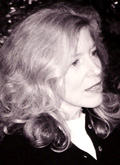
Milestones
{An Umbrella Invitational}

Milestones
{An Umbrella Invitational}

Lynne Knight
was born in Philadelphia, Pennsylvania, but grew up in Cornwall-on-Hudson, New York. After graduating from the University of Michigan, where she won two Hopwood awards, and from Syracuse University, where she was a fellow in poetry, she lived for a several years in Canada before returning to the States with her daughter. She taught in Upstate New York for many years and moved to Berkeley, California, in 1990. She teaches writing at two Bay Area community colleges. Lynne is the author of the poetry collections Dissolving Borders (Quarterly Review of Literature prize, 1996); Snow Effects; The Book of Common Betrayals (2002 Dorothy Brunsman Award from Bear Star Press); and Night in the Shape of a Mirror, as well as several chapbooks. Her poetry has appeared widely in literary journals and anthologies. Rita Dove chose one of her poems for Best American Poetry 2000 and her poems have been featured online by both Poetry Daily and Verse Daily. Visit her website. —Back to Milestones Contents— |
Lament
I took them all to forget you. [Originally published in Poetry Flash] Artist’s Statement
I
came back to the writing of poetry in 1989, after a long hiatus. Of the many poems I wrote that year, only one has survived, “Lament.” It’s the first poem that felt like a poem to me. I’d been not writing because I couldn’t tell the truth about my life, and when my life changed so that the truth could start to pour out, it did so in a way closer to confession than to poetry. Much of what I wrote had a distinct Plathian echo. (Heather McHugh once said that all women poets of her generation not only wanted to be Sylvia Plath, many of them thought they were Sylvia Plath. I belonged to both groups.) |
||
|
|
|||